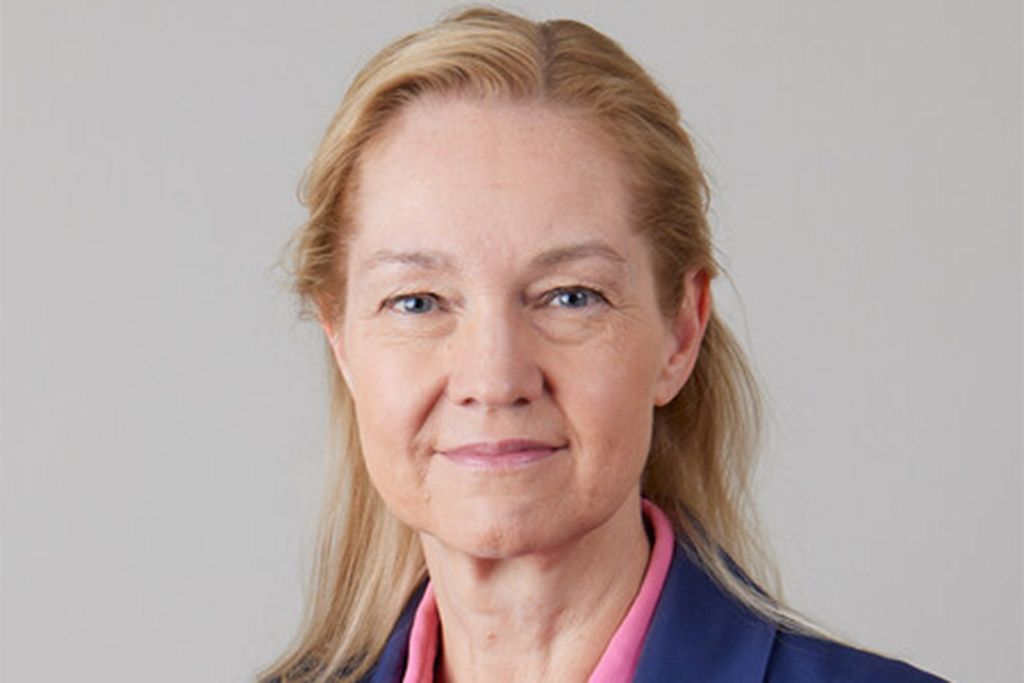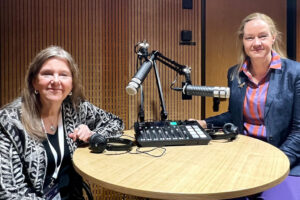April 19, 2023

As a former bank regulator, I appreciate and identify with the cultures of financial regulatory bodies. They are built to be careful, cautious, risk averse and very geared to avoiding error. Among financial regulatory organizations, central banks arguably are the most infused with cultures of carefulness. So it’s notable when we see bold exploration of change coming from the organization that is known as the “central bank of central banks” — the Bank for International Settlements.
My guest today is Cecilia Skingsley, head of the BIS Innovation Hub. I remember that it caught my eye several years ago when I first saw that BIS was launching an innovation initiative, and I’ve followed it with great interest ever since. So I was especially delighted this month to travel to Basel, Switzerland, to participate in the BIS’s first-ever Innovation Summit. It was there that I had an opportunity to sit down with Cecilia, whom I’d first met last fall at the Singapore Fintech Festival.
The BIS is the organization that makes sure that payments work, worldwide. It frames its role as providing safe and stable money, in the most efficient and useful way. In our discussion, Cecilia explains that this mission requires an approach that proactively embraces technology change, in the public interest. The goal of the Innovation Hub is to explore new technology challenges and opportunities — as she puts it, to demonstrate the “art of the possible,” and to leave it up to individual countries to decide what technologies to use and allow within their borders.
She describes the design of the BIS Hub system, which is actually a network of hubs distributed throughout the world. These organizations are experimenting with cutting-edge financial innovation, examining topics that range from suptech (supervisory technology) to climate change to cyber risk to CBDCs.
The Basel summit really impressed me. The Hub projects are delving into the thorniest problems that are surfacing as technology transforms payments. We heard from BIS General Manager Agustin Carstens and, via video, from European Central Bank President Christine Lagarde. We heard from deeply thoughtful central bank leaders like Ravi Menon of the Monetary Authority of Singapore (here is my recent podcast with him). Our sessions ranged from the winding road to CBDC adoption and using CDBCs across borders, to the regulatory lessons of the crypto winter, to anti-money laundering, to the ethical implications of using artificial intelligence and machine learning in the financial industry. The speakers and participants were drawn from government, industry, academia and civil society. The program also included a truly fascinating set of workshops on some of the BIS Hub projects underway — a tantalizing glimpse of experiments and pilots that are working their way toward being unveiled to the public. I recommend that everyone watch for them.
Notably, a key theme running through all of the discussions is that we absolutely have to have collaboration between the public and private sector if we hope to optimize the impacts of technology-driven change. Industry collaboration is often difficult for regulators, since that relationship — regulator and regulated — intrinsically involves friction. It’s designed to be arm’s length. One of my main pieces of advice to regulators is to develop new models and some cultural shifts that enable much more collaboration, while maintaining the appropriate distance. Regulators won’t be able to understand today’s fast-changing technology world from inside their own walls. They need to sit at the same tables with industry and work on problems together.
We’ve done two past shows with the BIS. We recently posted an episode with Tara Rice on new tech standards for payments, and we previously did a show with Andrew McCormack, just as he was moving to Singapore to head the newly formed hub there. Just before that, I had served as a judge in the first-ever global G20 regulatory TechSprint, and the winners from that competition were heading into the Singapore Hub for incubation.
Watch for a great deal of valuable innovation coming from the BIS.

More on Cecilia Skingsley
Cecilia Skingsley became Head of the BIS Innovation Hub in September 2022 and is a member of the BIS’s Executive Committee. Previously, she was First Deputy Governor of Sveriges Riksbank.
Most recently, Cecilia chaired the BIS’s Committee on Payments and Market Infrastructures Future of Payments Working Group. She was also the Governor of the Riksbank’s alternate on the General Council of the ECB and a member of the Advisory Technical Committee (ATC) of the European Systemic Risk Board (ESRB).
Ms Skingsley was Deputy Governor of the Riksbank from May 2013 to November 2019. Prior to that position she was Head of FX and Fixed Income Research and Chief Economist at Swedbank (2007-13), was Head of Financial Markets Section at Dagens Indutri (2000-07), and was Macro Analyst at ABN Amro Bank (1998-2000). She has also been a financial journalist.
Ms. Skingsley holds a degree in economics and political science from Stockholm University. She received a financial analyst degree from SSE Executive Education at Stockholm School of Economics (formerly IFL at Stockholm School of Economics) and studied journalism at Poppius School of Journalism in Stockholm.
More for our Listeners
An extra note: The Innovation Summit created a chance for me to have face-to-face time with two great friends I don’t get to see often, since they live in the UK and in Australia. One is Francesca Hopwood Road, who leads the BIS Hub in London, and the other is Deborah Young, who heads the Regtech Association. We took the opportunity to record a session for WiRI – Women in Financial Regulation — which Francesca (independently of her BIS role) founded with my AIR colleague Shelley Anderson. Here is our conversation in advice for women on how to build a personal brand.
We have great shows coming up. If all goes well, my next guest is going to be Chat GPT, so watch for that!
Watch also for our 200th show, and a special show for AIR’s 4th birthday, and another special show with our own Nick Cook on the lessons he has learned building an innovation department at a financial regulatory agency and helping other agencies do the same.
We’ll also have an episode with Jessica Rusu, the FCA’s Chief Data, Information and Intelligence Officer. I stopped in London on my return from Basel, and was fortunate that I happened to be at the FCA as they were celebrating their 10th anniversary. I was frankly astonished to hear about all their progress — including the fact that the agency is now fully in the cloud. A huge milestone. Both BIS and the FCA are doing world-leading innovation.
This month I’m participated in the Blockchain Foundation’s Inaugural Digital Assets & Decentralization Conference in Washington, on a panel with Ida Radebacher from the Aspen Institute on whether there is tension between our public policy on consumer protection and financial inclusion (spoiler alert: there is). I’ll also be speaking in May at Fintech Nexus (formerly known as LendIt) in New York City. And in June, I’ll be at the American Bankers Association compliance conference, which is merged this year with their risk conference. We have some very special programming in the works at the ABA.
Our AIR team has multiple TechSprints in development, including one supporting the U.S. Federal Housing Finance Agency, one with the Department of State on anti-corruption, and one with the National Credit Regulator of South Africa on how to connect rural borrowers to the formal credit system. We’re also planning a second TechSprint with the Bill and Melinda Gates Foundation – watch for information on that.
Meanwhile we are underway in our project with the National Bankers Association Foundation on helping minority depository institutions digitize.
Don’t forget to follow AIR on LinkedIn and Twitter. If you enjoy the show, it’s important to take a moment to leave us a five-star rating on your favorite podcast platform. You can follow me personally on Twitter @JoAnnBarefoot.
Stay informed by joining our mailing list
